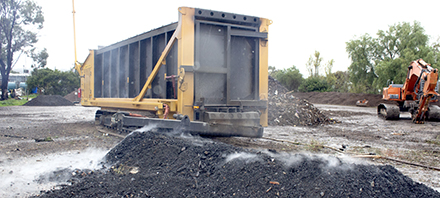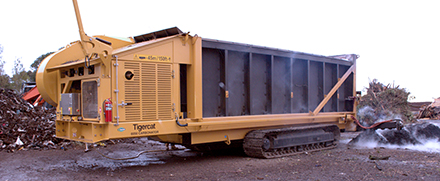A Tigercat carbonator has been used in an innovative new pilot project in Adelaide’s southern suburbs to remove feral olive trees from national parks and turning them into a product which is helping grow grapes at McLaren Vale vineyards. Source: Timberbiz
The carbonator reduces wood debris volume by 90% through an environmentally friendly carbon recycling process. Logs, limbs, brush, stumps, yard waste, pallets and other clean wood debris can be reduced with no pre-processing required.
This is the first time in South Australia that feral olive trees from Onkaparinga River National Park and Glenthorne National Park – Ityamaiitpinna Yarta are being used to create biochar, a product which can help retain nutrients, improve soil structure and increase water-holding capacity of soils.
The Tigercat 6050 was trucked to McLaren Vale from Queensland, and it being returned this weekend.
Biochar production is an environmentally friendly carbon recycling process which in this project is taking the olive trees, putting them in a Tigercat carbonator and burning the trees at temperatures of 500 degrees Celsius to create biochar.
The Biochar produced as part of the project processed and sold by the project’s commercial partners including to local McLaren Vale vineyards. It’s expected that any funds raised will be able to go back into the project to fund further olive control and revegetation works.
Minister for Environment and Water David Speirs said this is a first for national parks in South Australia to be converting feral olive trees into biochar.
“Our national parks conserve vitally important ecosystems, habitats, plants and animals, unique land formations, and culturally significant places,” Minister Speirs said.
“They are essential spaces to enjoy nature in all its forms and provide South Australians with a wide range of environmental, social and economic benefits.
“This truly exciting project is removing feral olive trees from the Onkaparinga River and Glenthorne national parks in out southern suburbs and turning them into biochar which is then used to help boost our agriculture sector.
“By removing an invasive pest plant species and turning it into a valuable commodity we are not only better protecting our beautiful flora and fauna but we supporting local industry in a win-win for the environment and our economy.








